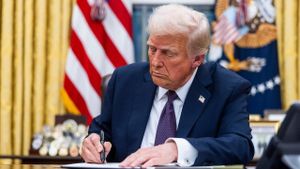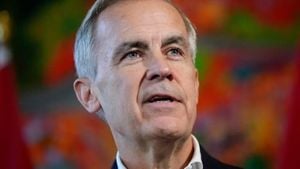During the recent Senate Finance Committee hearing, Robert F. Kennedy Jr. faced intense questioning from Democratic senators who challenged him on his controversial statements and past positions, particularly on vaccines and public health policies. The confirmation hearing, which lasted three hours, was marked by clashes over Kennedy's track record and statements he has made concerning health-related issues.
Senator Michael Bennet from Colorado directly confronted Kennedy on his claim from his book, The Real Anthony Fauci, where he stated, 'It’s undeniable, African AIDS is an entirely different disease from Western AIDS.' When asked if he authored this quote, Kennedy responded, 'I’m not sure,' which drew scrutiny from the committee. Kennedy did write those words, which insinuated skepticism over the statistics related to AIDS diagnosis, particularly those involving demographics and funding for health organizations aimed at combating the disease.
Another heated exchange arose when Senator Raphael Warnock of Georgia compared Kennedy's past comments to Nazi death camps, which Kennedy denied. He said, 'I don’t believe I ever compared the CDC to Nazi death camps.' Yet, transcripts from the 2013 conference reveal he had made such comparisons, linking the CDC's decisions to historical atrocities to highlight concerns over vaccine safety
Democrats, pushing back against his nomination, repeatedly cited Kennedy's past statements on vaccines as undermining public health. They raised alarms about his anti-vaccine rhetoric, with various senators expressing concerns over how his appointment could affect trust and health standards. Senator Bernie Sanders, the independent who caucuses with the Democrats, noted both men's shared backgrounds as presidential candidates yet clearly separated their views on health policy.
Kennedy attempted to portray himself as supportive of vaccination, stating, 'I believe vaccines play a key role in health care,' aiming to negate the narrative of him as anti-vaccine. Despite this, he did not escape tough questioning, especially from Senator Elizabeth Warren on his financial gains related to lawsuits against pharmaceutical companies linked to vaccines.
Endorsements from Republican senators, who praised Kennedy’s focus on reducing food additives, seemed to offset the heavy scrutiny from Democrats. Despite the divided opinions, Kennedy’s experience as the nominee for Trump’s administration appeared to give him combat-ready support from Republicans, who view him as technically capable of leading the Department of Health and Human Services, which oversees $1.7 trillion in federal spending.
Senator Bill Cassidy, who presided over the committee and has clinical experience, sought clarity on Kennedy’s views concerning Medicaid reform. His inquiries showed confusion on Kennedy's part about fundamental program operations, which resulted in Cassidy offering corrections during the hearing. Kennedy did not have substantial proposals, commenting, 'I don’t have broad proposals for dismantling the program,' during exchanges with Cassidy.
Kennedy's anti-vaccine stance has brought out polarized responses—while Republicans, such as Cassidy, openly debated him on medical facts, some expressed caution about diverging from the party line. If confirmed, Kennedy has pledged to explore avenues to reform health care and tackle the perceived influence of the pharmaceutical industry.
The looming issue of abortion rights also factored heavily during the confirmation hearing. Kennedy's fluctuated comments, relaying Trump's position on examining controversial medication like the abortion pill, drew appraisals from Democrats who demanded clarity on his stances.
While Kennedy shared he supports access to abortion, his history and vague commitments raised eyebrows, leading Senator Tina Smith to challenge him for linking antidepressants to the rise of school shootings.
Smith expressed concerns about the stigma of mental health medications, which Kennedy had linked to violent events, prompting backlash among senators and public health proponents.
The high-stakes nature of this confirmation hearing has put Kennedy at the center of the health policy debate. Sanders and other Democrats continue to prioritize the ramifications of appointing someone with Kennedy’s history to such a significant health position, as it relates to the healthcare of millions.
After the intense scrutiny from Democrats, Kennedy's future as Secretary of Health and Human Services remains uncertain. His ability to navigate these controversial topics—amidst rising scrutiny and polarized responses—will prove pivotal to his confirmation and could impact future health policies aimed at addressing America's healthcare challenges.



